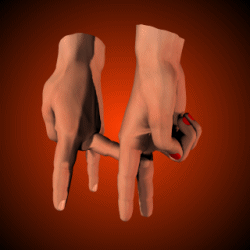
As promised, sexy time Q&A with sexologist Susana Mayer, host of the Erotic Literary Salon.
PHAWKER: So, just to bring the reader up to speed: Your name is Susana Mayer, you are 60-years-young, you live here in Philadelphia, you are the creator and host of The Erotic Literary Salon and you are a sexologist. What exactly is a sexologist?
SUSANA MAYER: It is the study of how we give and receive pleasure.
PHAWKER: And you were telling me that you are working on your doctoral dissertation…
SUSANA MAYER: Yes. The working title is, In Pursuit Of Sexual Pleasure Reframing Obsolagnium: What Is the Relationship Between Post-Menopausal Libidinal Status and Viewing Explicit Sex Videos?
PHAWKER: What does ‘obsolagnium’ mean?
SUSANA MAYER: The waning of sexual desire with age. The libido can be divided into two parts: instinctual drive and the response drive. The instinctual drive is sort of a self-preservation impulse to procreate early and often. This changes as we age. The emphasis shifts to response drive — response to stimuli that activates sexual desire — which, unlike the instinctual drive, remains strong throughout our lives. However, in the absence of stimuli, it tends to hibernate or go dormant. I get a lot of people, mostly women, telling me “I just don’t have the desire (for sex) like I used to.” What I tell them is, “You still have the desire, you just don’t know how to activate it.” And for a lot of women of a certain age, this means experimenting with new things. Like viewing pornography, or experimenting with BDSM or anal sex.
PHAWKER: Do you think women can enjoy pornography as much as men?
SUSANA MAYER: Barring certain blatantly degrading content, the real issue has always been access. Before the Internet, you had to venture into some sleazy backroom to get it, and women simply were not going to go there.  But now you can access it from the comfort, safety and relative anonymity of the Internet and I think that is bringing about a significant change in attitudes about pornography amongst men and women.
But now you can access it from the comfort, safety and relative anonymity of the Internet and I think that is bringing about a significant change in attitudes about pornography amongst men and women.
PHAWKER: Is it just me or has anal sex become mainstreamed? Obviously it’s been around since the beginning of human sexuality, but it seems to have shed some of its shamefulness, much the same way masturbation has.
SUSANA MAYER: Without a doubt. Once you get past the squeamishness and bathroom associations of that part of the body, [anal sex] has become a viable alternative for older women that find vaginal sex too painful. And then on the other end of the age spectrum, you have all these young people who consider everything up to vaginal intercourse to be maintaining their virginity. Likewise you have the Internet delivering all these diverse sexual realities to your doorstep, and at the same time there has been a number of very useful books explaining how women can derive great pleasure from anal sex — the anus is one of the largest clusters of nerve endings in the human body — and dispelling old myths that anal sex is by definition painful. If it hurts, you are doing it wrong.
PHAWKER: What about this phenomenon of teachers and students engaging in sexual relationships. Is this becoming more common, even epidemic, or do we just hear about it more because of the pervasiveness of the media in our lives?
SUSANA MAYER: This is definitely not a new thing. Although it is difficult to quantify it, I would venture that it is no more or less common today than when I was a schoolgirl. We just hear about it more because it is no longer being swept under the rug. You know, when I was growing up the word ‘sex’ was NEVER spoken in my household. I had one talk with my mother and it was literally about the birds and bees. I think we saw one instructional film in school that was sponsored by Kotex or Tampax, and it was utterly biological and beyond boring.
 PHAWKER: People tend to say America is prudish and puritanical compared to, say, Europe. But how do you reconcile that with the fact that Americans are bombarded with sexual messages from the minute they wake up until they go to bed. I would submit that there is a very vocal prudish minority in this country warning of impending Sodom & Gomorrah, but the majority of Americans are just sorta like “…hmm, that’s hot!”
PHAWKER: People tend to say America is prudish and puritanical compared to, say, Europe. But how do you reconcile that with the fact that Americans are bombarded with sexual messages from the minute they wake up until they go to bed. I would submit that there is a very vocal prudish minority in this country warning of impending Sodom & Gomorrah, but the majority of Americans are just sorta like “…hmm, that’s hot!”
SUSANA MAYER: Well, I would agree. But at the same time there is a disconnect between all these sexual messages we are bombarded with on a daily basis and what happens in the marital bedroom. I do a lot of work with women’s groups and it amazes me how many married people are NOT having sex.
PHAWKER: Tragic. What impact do you think Viagra and the like have had on human sexuality?
SUSANA MAYER: Well, the one part of the Viagra phenomenon that doesn’t get a lot of media play is that drug companies own studies show that only 50% of men prescribed Viagra got the prescription re-filled. Now, why is that? One reason is that that the pills didn’t work. They facilitate the flow of blood to the penis, but they don’t create sexual desire where none existed before. And if you are not aroused by your wife or partner in the first place, the pills don’t work.
PHAWKER: What about the phenomenon of the median age for puberty becoming younger and younger?
SUSANA MAYER: I was just having this conversation with some of my girlfriends, and we were all saying how we have never seen so many young girls with big boobs — and I am not talking about implants. When I was in school, there was only one or two girls with big boobs and now the reverse seems to be true. Obviously it has to do with heightened levels of estrogen in the food chain, cattle being fed hormones, etc. And the reality is nobody knows where this is heading. Very little is actually known about hormones and there are only a couple books on the topic that are worth reading.
have never seen so many young girls with big boobs — and I am not talking about implants. When I was in school, there was only one or two girls with big boobs and now the reverse seems to be true. Obviously it has to do with heightened levels of estrogen in the food chain, cattle being fed hormones, etc. And the reality is nobody knows where this is heading. Very little is actually known about hormones and there are only a couple books on the topic that are worth reading.
PHAWKER: What prompted you to start the Erotic Literary Salon?
SUSANA MAYER: Well, many reasons. But the biggest one was that there wasn’t one in this city.
PHAWKER: Last question, I have always wondered about this, and if anyone would know the answer it’s a sexologist: At any given moment on planet Earth, how many people are having sex? It must be a fairly astronomical number — it’s like there’s this massive, planet-wide mosaic of sex, or a global orgy that’s broken off into small discussion groups of ones and twos and threes.
SUSANA MAYER: I am sure somebody has that answer, Honey, but it’s not me. The only way to get a grasp on that kind of figure would be through surveys, and the sad reality of sex surveys is that people are probably not going to tell you the truth. Before I moved here, during a visit to town, I conducted a sex survey with some women in and around Rittenhouse Square. And then years later when I moved here, I befriended some of these same women and as they began to open up to me about their sex lives — as a friend, not a clinician taking a survey — I realized how, um, less than truthful their answers to my survey questions actually were. It wasn’t three partners, it  was 10!
was 10!
PHAWKER: So doesn’t that call into question the validity of every scientific sex study based on surveys?
SUSANA MAYER: Right, we really don’t know.
